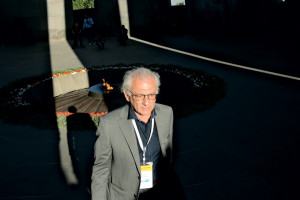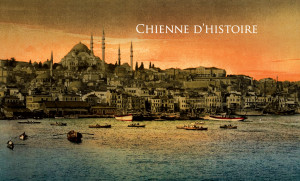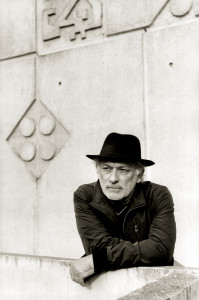“THE MAN WHO WE WERE WAITING FOR”
 Interview with director, actor SERGE AVETIKYAN
Interview with director, actor SERGE AVETIKYAN
Q: Mr. Avetikyan, each of the Western Armenians scattered around the world has their own history of massacre, deportation and survival, which is handed down from generation to generation. How did they go and how did your ancestors survive the Turkish genocide?
A: I made a film called “Return”. It is about the village of Siolozi, which lies near Iznik Lake, 30 km from the city of Bursa. Silozi is the birthplace of my ancestors, and I have returned there three times. Prior to the deportation, the village had 3,000 residents engaged in silk weaving (there were 7 silk factories in Siolozi) and growing olives. In 1915, when the Armenians of Siolozi were deported and they arrived in Konya with the residents of the surrounding villages, the Turkish prefect Cemal Bey, who disagreed with his government’s nationalist policies, helped the Armenians to tke refuge in the homes of Turkish and Kurdish residents in nearby settlements. They worked for them to take care of their needs. After a while, the displaced Armenians were able to return to their homes. Later, however, Ataturk exchanged the local Christian population with the Islamized people of Greece and Bulgaria.
Q: In fact, they were deported for the second time.
A: Yes. To this day, the Turks call the inhabitants of Siolozi pomog. They are not Turks, and they know it.
The history of the Turks is so deeply imbued with lies and deception that it will take decades and a great deal of willpower to clear it. But it is clear that they will not be able to pull that burden from century to century. One day they will get tired and they will want to give up the heavy legacy of the past.
 Q: There is a reference in your films to inviting the Armenian and Turkish peoples to a dialogue. Who should prepare them for that dialogue, the intellectuals and the artists, or the authorities and the political figures?
Q: There is a reference in your films to inviting the Armenian and Turkish peoples to a dialogue. Who should prepare them for that dialogue, the intellectuals and the artists, or the authorities and the political figures?
A: The dialogue between the Armenian and Turkish peoples is inevitable, and the sooner it takes place, the easier and more constructive it will be. Not only political figures and intellectuals, but every Armenian and Turk must initiate that dialogue, first of all in their souls, editing their way of thinking and worldview. Nationalism will lead to a deadlock on both sides. Turkey is implementing a systematic state program to distort history. The new generation of Turks has been taught since childhood that Armenians have betrayed, killed and destroyed them. And this entrenched mentality, of course, leaves no room for dialogue. And some Armenian strata do not accept the fact that there are progressive people in the Turkish society who are advocates of justice and want to erase the history of their own people from lies.
 Q: Mr. Avetikyan, don’t you think that our dependence on the expectation of international recognition and remorse of the Armenian Genocide does not correspond to the current significance of the issue? Is it worth waiting every year to find out if the President of the United States will use the word genocide, or what the Turkish authorities will say?
Q: Mr. Avetikyan, don’t you think that our dependence on the expectation of international recognition and remorse of the Armenian Genocide does not correspond to the current significance of the issue? Is it worth waiting every year to find out if the President of the United States will use the word genocide, or what the Turkish authorities will say?
A: I welcome your opinion. This is the opinion of an Armenian who has overcome oppression and overcome the genocide complex. But for my generation, the topic of genocide was very emotional, painful, and it may have been justified at the time. It has led to many initiatives. Thousands of pieces of evidence were collected, a lot of documentary material was made, films were made, and books were written … Now we have to rest. The ball is already in the Turkish court, and Turkish attempts to throw it out are in vain. When one of my films was shown in Turkey, I went on stage and talked to the audience. I said that the problem of the Armenian Genocide is not the problem of other Armenians, but of the Turks. It is very difficult to live, hiding from one’s own biography and not noticing the obvious like an ostrich.
 Q: Isn’t it difficult to refer to such great artist as, for example, Parajanov? Wasn’t there a fear that you might ruin the artist’s identity?
Q: Isn’t it difficult to refer to such great artist as, for example, Parajanov? Wasn’t there a fear that you might ruin the artist’s identity?
A: Of course, not everything can be turned into a movie. I knew Parajanov personally and allowed his soul to enter me. It’s a virus that you have to infect. Only then will the image you have created be reliable and full of new discoveries. You have to touch him from the inside with your soul. I consider that film a success.
By GAYANE POGHOSYAN
Category: #22 (1342) 3.06.2020 - 9.06.2020, Spiritual-Cultural, Spotlight










